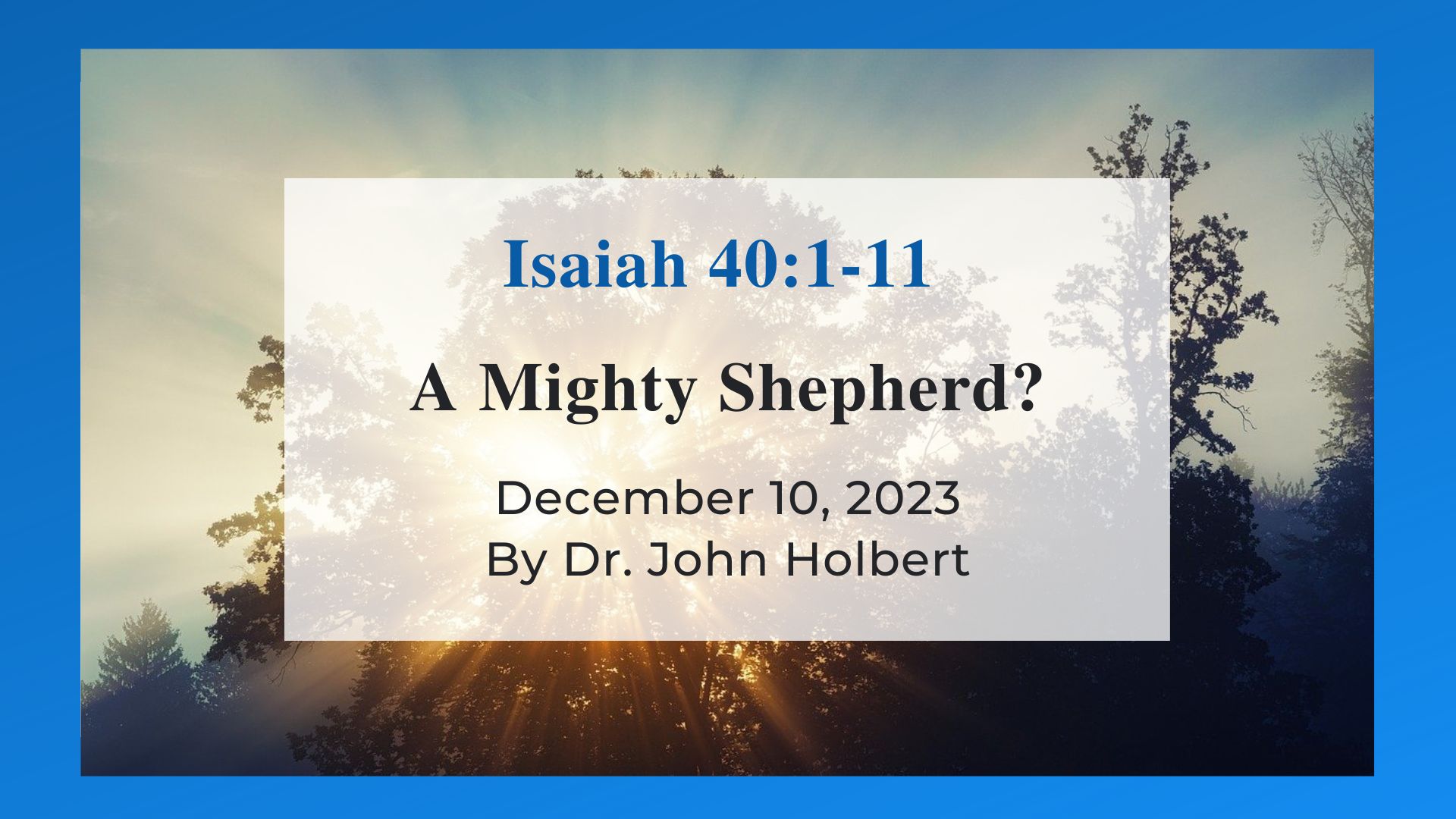A Mighty Shepherd? - Reflections on Isaiah 40:1-11
by Dr. John Holbert on Monday, December 4, 2023

A Mighty Shepherd?
Isaiah 40:1-11
The Peripatetic Hebrew Bible Preacher
Last Sunday, I tried to read Is.64 in the light of an historical context none too clear, hoping to find an oracle that might speak to us in our 21st century confusion and fear. We, too often perhaps, long for a God who will “tear the skies” and rush down to defeat our enemies and make life once again easy and comfortable. The problem, of course, is the designation of those enemies: just who are they, and why do we have the right to name them enemies when such easy divisions in society are far from simple. Vote for Trump, and you are my enemy. Vote for Biden, and you are my enemy. Would we really call on God to winnow our world like that? Just what sort of God would Advent/Christmas bring if such divisions in society were made, such us vs. them partitions? I want no part of such a vengeful and spiteful God!
And today we hear that very famous opening of II-Isaiah, made tuneful by the tenor aria “Comfort Ye,” from Handel’s ubiquitous “Messiah,” an aria I sang several times long ago in my own tenor days, days now long past. In sharp contrast to Is.64’s generally unknown historical context, Is.40’s context is quite unmistakable. We are here at the end of the Babylonian exile of Israel, sometime in the years surrounding 539BCE, when Cyrus of Persia has conquered the empire of Babylon, apparently without firing a shot (or more accurately without notching an arrow), swallowing the ancient once vast kingdom and its fabled city, allowing all former captives to return to their homes. Is.45 makes that history plain enough.
During the two-generation exile, Israel found itself trapped in a theological cauldron with multiple competing voices trying to explain just what had happened to the chosen people of YHWH, just why land, king, temple, had been snatched away. Had YHWH finally had enough of the appalling sinners? Some thought that. Had the prophets misled us about YHWH’s plans for Israel, and was this exile in fact part of that secret plan? Some thought that. Did YHWH exist at all, or was Marduk of Babylon or Baal of Canaan or Chemosh of Moab the real God of the world? Some thought that. But Isaiah 40 went in a different direction from each of these notions.
YHWH’s very first word to them is “comfort,” spoken “tenderly” (to the heart) to Jerusalem, assuring them that their “time of service,” and their “penalty” has been paid and that it was all too true that YHWH had indeed punished them for all their monstrous deeds (Is.40:1-2). But all that is now past. Now what the exiles may expect is the coming of YHWH, accompanied by natural tumults like rising valleys, flattened mountains, leveled rocky ground, in preparation for a straight highway through the desert for YHWH’s glory. This sounds rather like the God of power imagined in Is.64, that sky-tearing deity who shall come to smash our enemies and give us back our wonderful lives of ease and plenty.
But do not be fooled! It is easy to hear Is.40:10 just like that. “YHWH God comes with strength, God’s arm ruling, bringing both reward for the faithful and payment for the chosen. But Is.40:11 calls that portrait into serious question. YHWH’s strength turns out to be that of a shepherd feeding the flock, gathering the lambs in the divine arms, carrying them close to the divine bosom, ever so gently leading the pregnant sheep. The strength of YHWH is not to be found in acts of punishment and revenge, but in caring for and shepherding the people. And we are led back, I think, to that baby God once again, the child, not the warrior, who brings love and compassion and hope to the world, not division and strife and contention. Is.40 makes it plain that the God we hope for this and every Christmas is not the God of battle, but the God with a bottle, or at least the 1st-century equivalent of that bottle. The wonder and surprise of Christmas is found precisely there: we think we want the sky-tearing God but what we receive is the crying God, the infant “mewling and puking in its nurse’s arms,” as Shakespeare has it in “As You Like It.” Astonishingly there we see God, the God we actually need.
